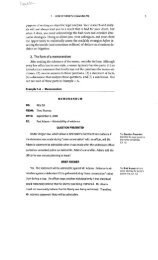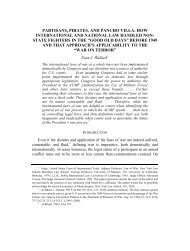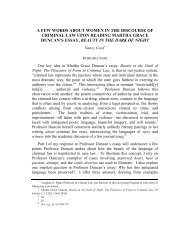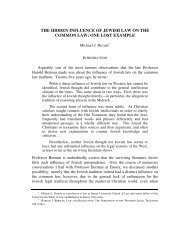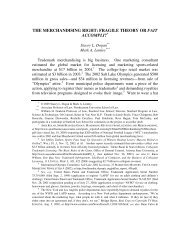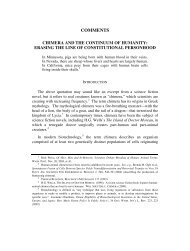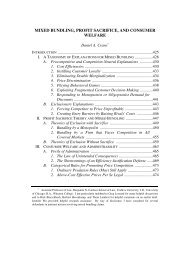life, liberty, and the pursuit of swords and armor - Emory University ...
life, liberty, and the pursuit of swords and armor - Emory University ...
life, liberty, and the pursuit of swords and armor - Emory University ...
You also want an ePaper? Increase the reach of your titles
YUMPU automatically turns print PDFs into web optimized ePapers that Google loves.
1324 EMORY LAW JOURNAL [Vol. 57<br />
virtual good, he could not be guilty <strong>of</strong> this crime. This requirement,<br />
unfortunately, makes <strong>the</strong> prosecution <strong>of</strong> <strong>the</strong> scenario described above—where<br />
a party member runs <strong>of</strong>f with ano<strong>the</strong>r’s excess goods—applicable only to<br />
situations where <strong>the</strong> state is able to prove that <strong>the</strong> accused planned for <strong>the</strong><br />
situation. 161 None<strong>the</strong>less, prosecutors should still be able to utilize <strong>the</strong>ft-bydeception<br />
statutes to prosecute thieves who utilize a scam to obtain ano<strong>the</strong>r<br />
player’s virtual goods in those limited circumstances where <strong>the</strong> state has<br />
evidence that <strong>the</strong> accused planned <strong>the</strong> <strong>the</strong>ft in advance.<br />
Thus, current <strong>the</strong>ft-by-deception statutes could be used to prosecute virtualgood<br />
<strong>the</strong>ft criminals, but only in limited situations <strong>and</strong> with discovery-related<br />
difficulties. This statute, however, should prove useful to prosecute thieves<br />
who utilize scams to obtain virtual goods.<br />
c. Embezzlement<br />
Prosecutors should also be able to use embezzlement statutes to prosecute<br />
<strong>the</strong> <strong>the</strong>ft <strong>of</strong> virtual goods. To prove embezzlement under state penal statutes,<br />
prosecutors must show that <strong>the</strong>re was a knowing conversion 162 <strong>of</strong> property by<br />
one lawfully entrusted with its possession. 163 Embezzlement may prove a<br />
better tool than <strong>the</strong>ft by deception for <strong>the</strong> prosecution <strong>of</strong> virtual good <strong>the</strong>fts<br />
arising from situations where a party member, entrusted to hold a party<br />
member’s virtual goods, runs <strong>of</strong>f with such goods.<br />
Embezzlement statutes do not present <strong>the</strong> possession <strong>and</strong> control problems<br />
typically associated with <strong>the</strong> application <strong>of</strong> <strong>the</strong>se statutes to virtual goods 164<br />
because <strong>the</strong> courts recognize that embezzlement statutes may be properly<br />
161 It is possible that <strong>the</strong> defendant admitted to o<strong>the</strong>r players that he was anticipating <strong>the</strong> situation <strong>and</strong><br />
intended to deceive <strong>the</strong> victim. Prosecutors could obtain such chat records by accessing <strong>the</strong> developer’s<br />
servers, but this would implicate privacy concerns. Still, prosecutors could also obtain testimony from those<br />
players who witnessed <strong>the</strong> defendant’s admission.<br />
162 Conversion, within <strong>the</strong> meaning <strong>of</strong> embezzlement statutes, is <strong>the</strong> “fraudulent appropriation <strong>of</strong> a thing<br />
to one’s own use <strong>and</strong> beneficial enjoyment.” 29A C.J.S. Embezzlement § 16 (2007) (citing State v. Pietranton,<br />
84 S.E.2d 774 (W. Va. 1954)). Appropriation, however, is something more than mere possession <strong>of</strong> <strong>the</strong><br />
property. See State v. Barbossa, 384 A.2d 523, 525 (N.J. Super. Ct. App. Div. 1976).<br />
163 Paul C. Jorgensen, Embezzlement, 24 AM. CRIM. L. REV. 513, 513 (1987). “[E]mbezzlement statutes<br />
protect against knowing conversion <strong>of</strong> specific items or services which are in <strong>the</strong> possession <strong>of</strong> ano<strong>the</strong>r<br />
occupying a designated fiduciary relation . . . [<strong>and</strong> require] <strong>the</strong> prosecution [to] prove that an ownership<br />
interest is in someone o<strong>the</strong>r than <strong>the</strong> accused, <strong>and</strong> that <strong>the</strong>re has been a conversion <strong>of</strong> <strong>the</strong> property with<br />
fraudulent intent.” Id.<br />
164 See supra text accompanying notes 140–43.



